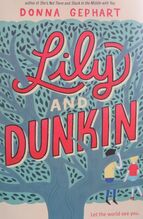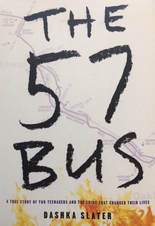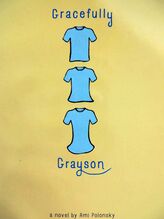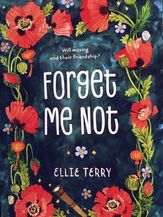Lily and Dunkin
|
|
Book Summary:
Tim has always known he is really a girl, and, with the support of his older sister and his best friend, he is getting more comfortable making a more public transition to become Lily. Her dad is not very comfortable with the idea, wanting to protect Lily from potential teasing and bullying at school, which is already extensive. Norbert hates his name and doesn't like taking his medications. He moves to town and meets Lily, but then he gets to know Tim, who christens him "Dunkin." He also meets some bullying, basketball-playing cool kids who might be his ticket to a new social life, if he can look away from the fact that they are abusing Tim at school. Not only is Norbert new to basketball and struggling with the Florida heat, but he is unreliable about taking his anti-psychotic medication, and still reeling from a tragedy with his father. Book Review: There aren't a lot of books for middle school audiences that address the challenges of transgender people or people with bipolar disorder, and even fewer which address both. Because of this, it's a book with value because many readers will be so relieved to find some representation in its pages. Each person has a unique story, of course, and when there aren't many books on a topic, it can make the pressure to make the characters realistically representative even greater. My own experience with both issues is as a learner, so I'm not very qualified to speak to its authenticity in those terms. Lily's courage to "practice" being herself in public, the expense of the medical treatments, and her conflict with her father are all things that seem believable and garner compassion, especially from readers who don't deal with any of those challenges and haven't considered them before. Dunkin's struggle to improve at basketball, including the pressure he feels to do well for his team, as well as his difficulty doing the right thing standing up for Tim at school are relatable and realistic (Lily presents as Tim for these scenes, so that's the label I've used here). However, it's not completely believable that Lily would continue to trust Dunkin. Lily's best friend Dare and her older sister Sarah seem a bit two-dimensional, only existing to advance Lily's journey. The campaign to save the tree seems unnecessary to the plot. Dunkin's family tragedy is repeatedly referenced through the book but not explained until the end, which was more tiresome than suspenseful. The bullying in this story is severe - and troubling that adults never catch it or intervene - another important facet to discuss in a student book club. There are some strong moments and unique details in this story, but in places the sentences are uneven - overly simplistic and then unnaturally wordy within the same character's perspective, scene, and mood. There are details that charm and others (particularly about the heat and unwelcome health food) that are repetitive or get in the way. It's a book worth reading, but more for what it says than the way it's told. "I break off bits of strawberry Pop-Tart and attempt to fill the empty space inside myself, bite after bit. Unfortunately, it's like trying to fill the Grand Canyon with breadcrumbs. After two Pop-Tarts, I feel stuffed and empty at the same time." |
If you like this book, you may also like . . .











